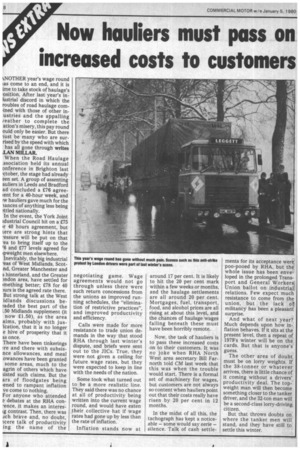Now hauliers must pass on increased costs to customers
Page 20

If you've noticed an error in this article please click here to report it so we can fix it.
ILNOTHER year's wage round las come to an end, and it is ime to take stock of haulage's 9sition. After last year's inltistrial discord in which the roubles of road haulage cornined with those of other inustries and the appalling feather to complete the ation's misery, this pay round ould only be easier. But there lust be many who are surrised by the speed with which has all gone through writes LAN MILLAR.
When the Road Haulage .ssociation held its annual onference in Brighton last ictober, the stage had already een set. A group of assenting auliers in Leeds and Bradford ad concluded a £76 agreetent for a 40-hour week, and !-Nw hauliers gave much for the lances of anything less being ?Wed nationally.
In the event, the York Joint idustrial Council hit on a £75 ,r 40 hours agreement, but iere are strong hints that -essure will be put on that -ea to bring itself up to the 76 and £77 levels agreed for rpweight men elsewhere.
Inevitably, the big industrial • eas of West Midlands, Scotnd, Greater Manchester and s hinterland, and the Greater )ndon area, have settled for Imething better; £78 for 40 )urs is the agreed rate there. But strong talk at the West idlands discussions beaded the best part of the ,.50 Midlands supplement (it now £1.50), as the area aims, probably with jusication, that it is no longer e hive of prosperity that it as once.
There have been tinkerings re and there with subsisnce allowances, and meal owances have been granted some areas, much to the agrin of others which have 3isted such claims. But the ars of floodgates being ,ened to rampant inflation ye come to nothing.
For anyone who attended e debates at the RHA con-ence, it makes an interesig contrast. Then, there was ich brave and, no doubt, icere talk of productivity ing the name of the negotiating game, Wage agreements would not go through unless there were such return concessions from the unions as improved running schedules, the "elimination of restrictive practices", and improved productivity and efficiency.
Calls were made for more resistance to trade union demands in the way that stood RHA through last winter's dispute, and briefs were sent out to the JICs. True, they were not given a ceiling for future wage rates, but they were expected to keep in line with the needs of the nation.
Some took what turned out to be a more realistic line. They said there was no chance at all of productivity being written into the current wage round, and would have eaten their collective hat if wage rates had gone up by less than the rate of inflation.
Inflation stands now at around 17 per cent. It is likely to hit the 20 per cent mark within a few weeks or months, and the haulage settlements are all around 20 per cent. Mortgages, fuel, transport, food, and alcohol prices are all rising at about this level, and the chances of haulage wages falling beneath these must have been horribly remote.
Now, the task of hauliers is to pass these increased costs on to their customers. It was no joke when RHA North West area secretary Bill Farnorth told CM last week that this was when the trouble would start. There is a formal set of machinery for wages, but customers are not always so content when hauliers point out that their costs really have risen by 20 per cent in 12 months.
In the midst of all this, the tachograph has kept a noticeable — some would say eerie — silence. Talk of cash settle ments for its acceptance were poo-pooed by RHA, but the whole issue has been enveloped in the prolonged Transport and General Workers Union ballot on industrial relations. Few expect much resistance to come from the union, but the lack of militancy has been a pleasant surprise.
And what of next year? Much depends upon how inflation behaves. If it sits at the present level, then a repeat of 1979's winter will be on the cards. But that is anyone's guess.
The other area of doubt must be on lorry weights. If the 38-tonner or whatever arrives, there is little chance of it coming without a drivers' productivity deal. The topweight man will then become something closer to the tanker driver, and the 32-ton man will be a second-class lorry-driving citizen.
But that throws doubts on where the tanker men will stand, and they have still to settle this winter.
















































































